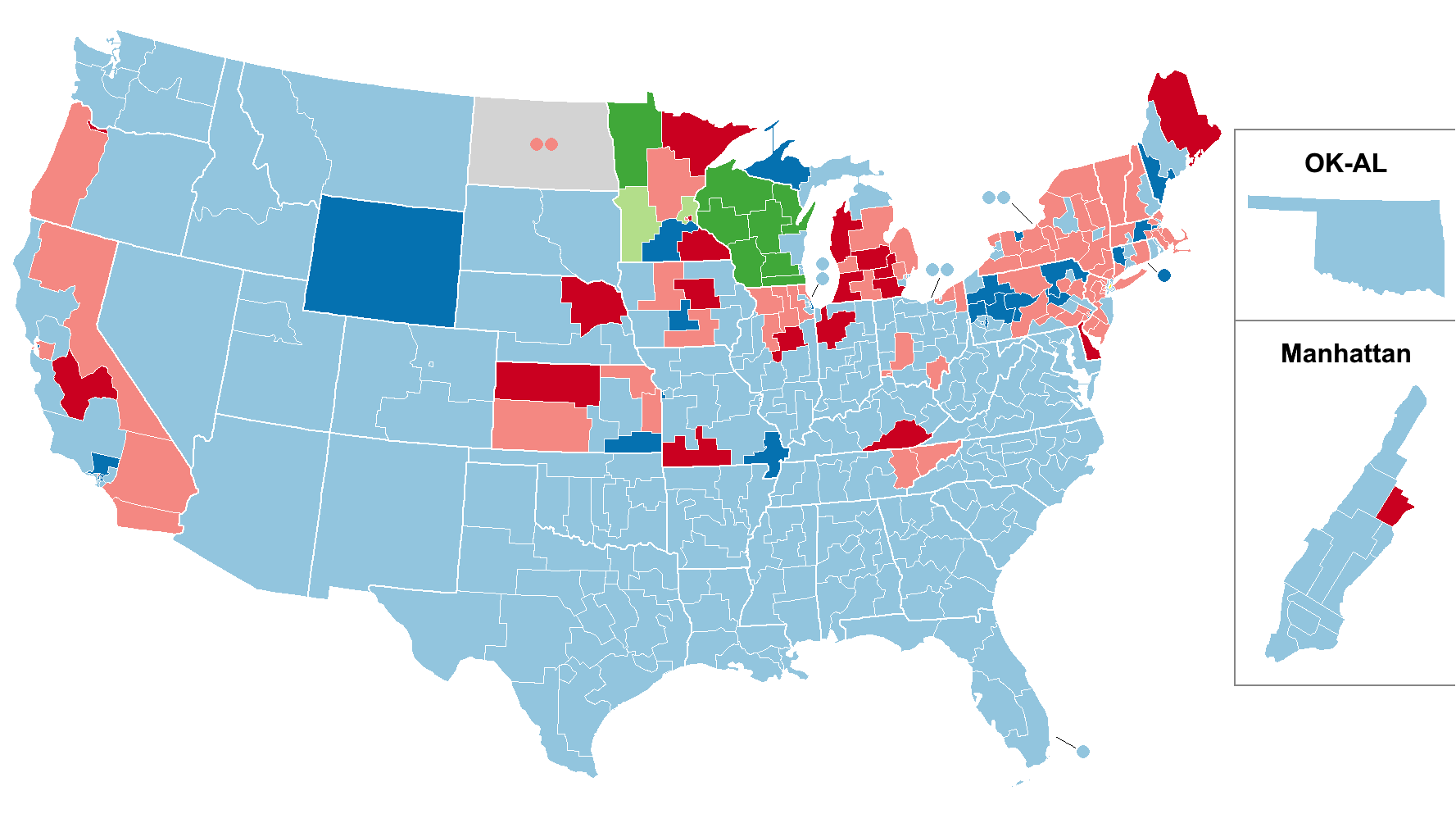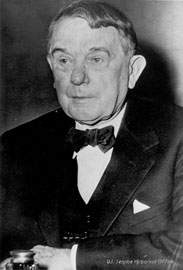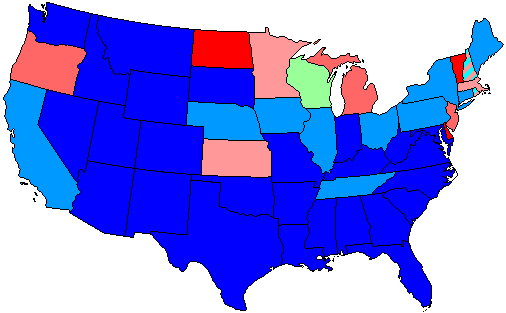|
1934 United States Elections
The 1934 United States elections were held on November 6, 1934. The election took place in the middle of Democratic President Franklin D. Roosevelt's first term, during the Great Depression. The Democrats built on the Congressional majorities they had won in the previous two elections. In the House of Representatives, Roosevelt's party gained nine seats, mostly from the Republican Party. The Democrats also gained nine seats in the U.S. Senate, thereby winning a supermajority. A Progressive also unseated a Republican in the Senate. This marked the first time that an incumbent president's party did not lose seats in both houses in a midterm election, followed by 1998 and 2002. The election was perhaps the most successful midterm of the 20th century for the party in control of the presidency. Despite opposition from Republicans, business organizations such as the United States Chamber of Commerce, and disaffected Democrats who formed the American Liberty League, Roosevelt's New Dea ... [...More Info...] [...Related Items...] OR: [Wikipedia] [Google] [Baidu] |
United States Midterm Election
Midterm elections in the United States are the Elections in the United States, general elections that are held near the midpoint of a President of the United States, president's four-year term of office, on Election Day (United States), Election Day on the Tuesday after the first Monday in November. Federal offices that are up for election during the midterms include all 435 seats in the United States House of Representatives, and 33 or 34 of the 100 seats in the United States Senate. In addition, 34 of the 50 U.S. states elect their Governor (United States), governors for four-year terms during midterm elections, while Vermont and New Hampshire elect governors to two-year terms in both midterm and presidential elections. Thus, 36 governors are elected during midterm elections. Many states also elect officers to their State legislature (United States), state legislatures in midterm years. There are also elections held at the municipal level. On the ballot are many mayors, oth ... [...More Info...] [...Related Items...] OR: [Wikipedia] [Google] [Baidu] |
United States Chamber Of Commerce
The United States Chamber of Commerce (USCC) is the largest lobbying group in the United States, representing over three million businesses and organizations. The group was founded in April 1912 out of local chambers of commerce at the urging of President William Howard Taft and his Secretary of Commerce and Labor Charles Nagel. It was Taft's belief that the "government needed to deal with a group that could speak with authority for the interests of business". The current president and CEO of the Chamber is Suzanne P. Clark. She previously worked in the Chamber from 1997 to 2007, and returned in 2014, holding multiple executive roles before being named the organization's first female CEO in February 2021. History The U.S. Chamber of Commerce was founded at a meeting of delegates on April 22, 1912. An important catalyst for the creation of the U.S. Chamber of Commerce were two prior business engagements between the U.S. and Japan. In 1908, Eiichi Shibusawa invited the first ... [...More Info...] [...Related Items...] OR: [Wikipedia] [Google] [Baidu] |
General Elections In The United States
A general officer is an officer of high rank in the armies, and in some nations' air forces, space forces, and marines or naval infantry. In some usages the term "general officer" refers to a rank above colonel."general, adj. and n.". OED Online. March 2021. Oxford University Press. https://www.oed.com/view/Entry/77489?rskey=dCKrg4&result=1 (accessed May 11, 2021) The term ''general'' is used in two ways: as the generic title for all grades of general officer and as a specific rank. It originates in the 16th century, as a shortening of ''captain general'', which rank was taken from Middle French ''capitaine général''. The adjective ''general'' had been affixed to officer designations since the late medieval period to indicate relative superiority or an extended jurisdiction. Today, the title of ''general'' is known in some countries as a four-star rank. However, different countries use different systems of stars or other insignia for senior ranks. It has a NATO rank sc ... [...More Info...] [...Related Items...] OR: [Wikipedia] [Google] [Baidu] |
1934 Elections In The United States
Events January–February * January 1 – The International Telecommunication Union, a specialist agency of the League of Nations, is established. * January 15 – The 8.0 Nepal–Bihar earthquake strikes Nepal and Bihar with a maximum Mercalli intensity of XI (''Extreme''), killing an estimated 6,000–10,700 people. * January 26 – A 10-year German–Polish declaration of non-aggression is signed by Nazi Germany and the Second Polish Republic. * January 30 ** In Nazi Germany, the political power of federal states such as Prussia is substantially abolished, by the "Law on the Reconstruction of the Reich" (''Gesetz über den Neuaufbau des Reiches''). ** Franklin D. Roosevelt, President of the United States, signs the Gold Reserve Act: all gold held in the Federal Reserve is to be surrendered to the United States Department of the Treasury; immediately following, the President raises the statutory gold price from US$20.67 per ounce to $35. * February 6 – French pol ... [...More Info...] [...Related Items...] OR: [Wikipedia] [Google] [Baidu] |
Kelayres Massacre
The Kelayres massacre was a shooting attack that took place the evening of November 5, 1934 in the coal-mining village of Kelayres, Pennsylvania. An election-eve parade and rally by Democratic Party (United States), Democrats was fired on by multiple shooters as it passed the home of Joseph James Bruno, known as "Big Joe", the local Republican Party (United States), Republican boss. Three victims died almost immediately and two others died over the next two days. The attack received national news coverage, and accounts of it shared the front page with early election news in several major newspapers. The top newly elected Pennsylvania Democrats attended the funerals. Six members of the Bruno family were eventually found guilty of multiple murder charges in four trials, with Bruno and his brother Phil receiving life sentences. Bruno escaped from prison, leading to the then-largest manhunt in Pennsylvania history. He was caught eight months later. All of the Bruno family members ... [...More Info...] [...Related Items...] OR: [Wikipedia] [Google] [Baidu] |
1934 United States Gubernatorial Elections
United States gubernatorial elections were held in 1934, in 34 states, concurrent with the House A house is a single-unit residential building. It may range in complexity from a rudimentary hut to a complex structure of wood, masonry, concrete or other material, outfitted with plumbing, electrical, and heating, ventilation, and air condi ... and Senate elections, on November 6, 1934 (September 10 in Maine). Results See also * 1934 United States elections ** 1934 United States Senate elections ** 1934 United States House of Representatives elections References Notes {{USGovElections November 1934 events ... [...More Info...] [...Related Items...] OR: [Wikipedia] [Google] [Baidu] |
1934 United States Senate Elections
The 1934 United States Senate elections were held in the middle of Democratic President Franklin D. Roosevelt's first term. During the Great Depression, voters strongly backed Roosevelt's New Deal and his allies in the Senate, with Democrats picking up a net of nine seats, giving them a supermajority (which required 64 seats, two-thirds of the total 96 seats in 1934). This marked the first time that an incumbent president's party did not lose seats in both houses in a midterm election, followed by 1998 and 2002. This was also the first time in American history that the opposition party failed to flip any Senate seats, something that only occurred once since, in 2022. Gains and losses Republicans lost ten seats: One seat changed from Republican to Progressive when an incumbent was re-elected to the new party. Democrats took nine seats, including an open seat in Maryland and the seats of eight incumbents. Losing incumbents # Connecticut: Frederic C. Walcott (R) lost to Fran ... [...More Info...] [...Related Items...] OR: [Wikipedia] [Google] [Baidu] |
1934 United States House Of Representatives Elections
The 1934 United States House of Representatives elections were held in the middle of President Franklin D. Roosevelt's first term. The Democratic Party continued its progress, gaining another 9 net seats from the opposition Republican Party, who also lost seats to the Progressive Party. The Republicans were reduced below one-fourth of the chamber for the first time since the creation of the party. The Wisconsin Progressive Party, a liberal group which allied with the Democrats, also became a force in Wisconsin politics. The 1934 elections can be seen as a referendum on New Deal policies. While conservatives and people among the middle class who did not bear the brunt of the depression saw New Deal programs as radical, lower-income voters overwhelmingly voted in this election cycle to continue the implementation of Roosevelt's agenda. This marked the first time that an incumbent president's party did not lose seats in both houses in a midterm election, followed by 1998 and 2002. ... [...More Info...] [...Related Items...] OR: [Wikipedia] [Google] [Baidu] |
Harry S
Harry may refer to: TV shows * ''Harry'' (American TV series), a 1987 American comedy series starring Alan Arkin * ''Harry'' (British TV series), a 1993 BBC drama that ran for two seasons * ''Harry'' (talk show), a 2016 American daytime talk show hosted by Harry Connick Jr. People and fictional characters * Harry (given name), a list of people and fictional characters with the given name * Harry (surname), a list of people with the surname * Dirty Harry (musician) (born 1982), British rock singer who has also used the stage name Harry * Harry Potter (character), the main protagonist in a Harry Potter fictional series by J. K. Rowling Other uses * Harry (derogatory term), derogatory term used in Norway * ''Harry'' (album), a 1969 album by Harry Nilsson *The tunnel used in the Stalag Luft III escape ("The Great Escape") of World War II * ''Harry'' (newspaper), an underground newspaper in Baltimore, Maryland See also *Harrying (laying waste), may refer to the following historical ... [...More Info...] [...Related Items...] OR: [Wikipedia] [Google] [Baidu] |
New Deal
The New Deal was a series of programs, public work projects, financial reforms, and regulations enacted by President Franklin D. Roosevelt in the United States between 1933 and 1939. Major federal programs agencies included the Civilian Conservation Corps (CCC), the Works Progress Administration (WPA), the Civil Works Administration (CWA), the Farm Security Administration (FSA), the National Industrial Recovery Act of 1933 (NIRA) and the Social Security Administration (SSA). They provided support for farmers, the unemployed, youth, and the elderly. The New Deal included new constraints and safeguards on the banking industry and efforts to re-inflate the economy after prices had fallen sharply. New Deal programs included both laws passed by Congress as well as presidential executive orders during the first term of the presidency of Franklin D. Roosevelt. The programs focused on what historians refer to as the "3 R's": relief for the unemployed and for the poor, recovery of ... [...More Info...] [...Related Items...] OR: [Wikipedia] [Google] [Baidu] |
American Liberty League
The American Liberty League was an American political organization formed in 1934. Its membership consisted primarily of wealthy business elites and prominent political figures, who were for the most part conservatives opposed to the New Deal of President Franklin D. Roosevelt. The group emphasized private property and individual liberties. Its leader Jouett Shouse called on members to: :defend and uphold the constitution of the United States ... to teach the necessity of respect for the rights of persons and property as fundamental to every successful form of government ... teach the duty of government to encourage and protect individual and group initiative and enterprise, to foster the right to work, earn, save, and acquire property, and to preserve the ownership and lawful use of property when acquired. It was highly active in spreading its message for two years. Following the landslide re-election of Roosevelt in 1936, it sharply reduced its activities. It disbanded entirely ... [...More Info...] [...Related Items...] OR: [Wikipedia] [Google] [Baidu] |





